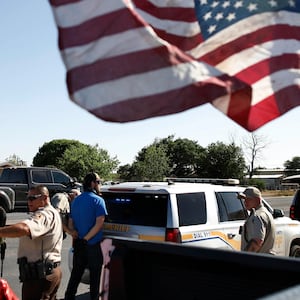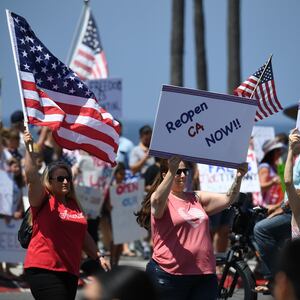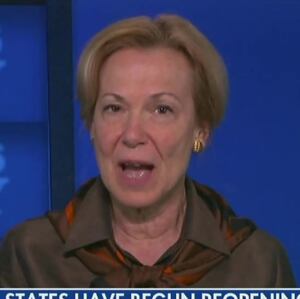On Thursday, the Professional Beauty Federation of California published a press release to the “Hot Topics” section of their website. It was titled: “Time to Sue Governor Newsom.”
The release came in response to Gov. Gavin Newsom’s announcement that the following morning, California would officially enter “Phase Two” of the “Safer at Home” order. Select businesses, from florists to clothing retailers to toy stores, would be able to resume operations in a limited capacity. But absent from the list of acceptable businesses: beauty salons. Newsom placed businesses like nail salons and barbershops in “Phase Three”—a stage he believes to be “months, not weeks” away.
“This whole thing spread in the state of California—the first community spread—was in a nail salon,” Newsom said in a press conference last week, without providing details about the date or location of the case. “Many of the practices that you would otherwise expect of a modification were already in play in many of these salons, with people that had procedure masks on, were using gloves, and were advancing higher levels of sanitation.”
The news has thrust nail salons onto the frontline of a growing coronavirus revolt in California, a battle being waged in many more American cities, like Dallas, where hairdresser Shelley Luther became a star of the anti-lockdown movement when she opted to go to jail rather than comply with an order to close her hair salon.
On Monday morning, the Professional Beauty Federation of California will file a lawsuit in federal court demanding a regulated reopening process of their salons.
“We were 100 percent behind the lockdown, so that we would not overwhelm our hospitals,” the group’s legal counsel Fred Jones said in an interview with The Daily Beast. “However, after two months of the lockdown, in which, by Gov. Newsom’s own admission, we have succeeded—we have checked the mark, we have flattened the curve—we were anticipating that the governor would allow for gradual reopenings of our beauty salons under strict new guidelines.”
Their argument, Jones said, hinges on the fact that, without regulated reopening, stylists will be forced underground to meet financial ends, resulting in a potentially more dangerous risk.
“A lot of our stylists are on the brink of starvation in order to make their leases and make ends meet,” Jones said. “So you have a volatile combination of desperate clients and desperate stylists. We know that will lead to thousands of our stylists going underground and moving kitchen to kitchen and house to house. That’s reality. Nobody can argue that. So the real question is: how do you stop that from happening if you’re the governor? You can’t.”
He suggested a gradual and controlled reopening would be safer than “stylists going house to house and spreading more than beauty.”
Some salons statewide have already opened, defying the statewide order, like an Orange County nail spa owner who has vowed to stay open despite being handed a citation by local police, who ordered her to appear in court in July.
“I have to do what I have to do. I’m fighting to provide for my children and myself and my family,” another salon owner, Breann Curtis, of The Clip Cage barbershop in Auburn, California, told Fox40 about her decision to reopen. “It’s very hard. I’m pregnant. I have children.”
“Just going into debt every single day,” added Tisha Fernhoff, who owns The Beauty Bar Salon in the same Auburn shopping center. “How much longer am I supposed to just go down the rabbit hole before I just throw in the towel and go back to work?”
According to Jones, the California State Board of Barbering and Cosmetology—which issues all 623,442 beauty licenses in the state—has already drafted a protocol for how salons could reopen under the current conditions. He claimed Newsom had blocked the plan from distribution, to avoid mixed messaging. (Newsom’s office didn’t respond to a request for comment and a spokesperson for the Board of Barbering and Cosmetology said their draft protocols “haven't been published because they are not finished.”)
“We want him to release the plan so that our professionals can start stocking up,” Jones said. “We know we’ll need masks. Will shields be required for these services? They probably will.”
If such a plan was to go into effect, Jones said, salons would use personal protective equipment widely. They would stagger appointments to avoid crowded waiting rooms, spread out work stations and shift schedules, implement a touchless pay system, and remove anything in the waiting rooms that could carry contagion. “So, sorry no more magazines and newspapers for our clientele,” Jones said.
But the Centers for Disease Control and Prevention (CDC) recommends maintaining a distance of six feet from other people—a practice that would be all but impossible in salon settings.
There are 53,694 licensed beauty salons in California, representing 313,734 stylists or cosmetologists, 34,093 barbers, 90,392 estheticians, 1,679 electrologists, and 129,802 manicurists, according to the State Board of Barbering and Cosmetology. All of these workers, Jones said, have to complete between 350 and 1600 hours of formal education before acquiring their license, including training in sanitization.
Jones emphasized that the lawsuit stemmed from financial desperation, a sentiment shared across the country. The Labor Department announced Friday that the economy lost over 20.5 million jobs in April alone, putting the national unemployment rate at its highest since the Great Depression: 14.7 percent.
But the devastation has hit the beauty sector differently than many industries. Over 80 percent of salon workers are independent contractors, meaning each stylist represents their own business. By extension, many salon owners are basically landlords, “whose income relies on those booth owners,” Jones said. As a result, most salon workers qualify for unemployment benefits under the Coronavirus Aid, Relief and Economic Security Act, signed by Trump in March—although the program is riddled with loopholes, has frequently run out of money, and may not cover their entire income, which heavily relies on tips.
It is salon owners who stand to gain the most from the lawsuit. “Freelance workers do benefit on unemployment benefits,” Jones said. “But most of those Paycheck Protection Program reimbursements are based on your payments. If you’re a salon owner, you don’t have a payroll. Those stylists are their own proprietors.”
On Friday, Senators Bernie Sanders (I-VT), Ed Markey (D-MA), and Kamala Harris (D-CA) introduced legislation to give a majority of Americans $2,000 a month throughout the pandemic. Asked whether the bill could provide financial relief to salon workers, while allowing them to maintain social distancing, Jones seemed doubtful that it would pass.
“It’s the proverbial ‘check is in the mail’ promise,” he said. “When you’re dealing with true economic devastation, let me tell you, most of our licensees will not be banking on a divided Congress and a White House that is also divided. While Washington fiddles, our stylists are burning.”









